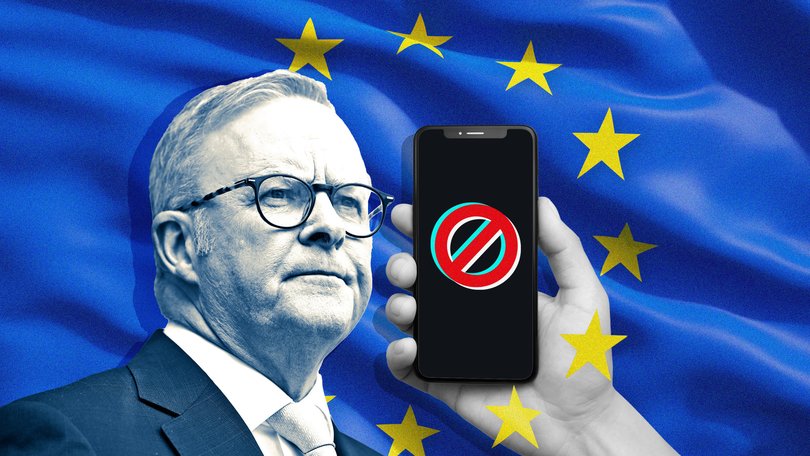Prime Minister Anthony Albanese welcomes EU following Australia’s under-16s social media ban
Australia’s landmark social media ban for under-16s has gone global, with EU chief Ursula von der Leyen announcing plans for a similar crackdown.

Prime Minister Anthony Albanese has backed Europe’s proposal to copy Australia’s social media ban.
Australia’s ban, first supported by the Coalition and therefore supported by both sides of the house, is due to come into effect on December 10.
Governments around the world have taken notice, with supporters ranging from parents’ groups to police officers, urging their leaders to follow suit.
Sign up to The Nightly's newsletters.
Get the first look at the digital newspaper, curated daily stories and breaking headlines delivered to your inbox.
By continuing you agree to our Terms and Privacy Policy.Mr Albanese has been repeatedly consulted about the policy during talks with counterparts overseas, wanting to know how it will work.
Overnight, EU Commission President Ursula von der Leyen used her State of the Union address to the European Parliament to announce that she was one of those close observers.
“Our friends in Australia are pioneering a social media restriction,” President von der Leyen told Members of the European Parliament in Strasbourg.
“I am watching the implementation of their policy closely to see what next steps we can take here in Europe.
“I will commission a panel of experts to advise me by the end of this year on the best approach for Europe.
“Because when it comes to our kids’ safety online, Europe believes in parents, not profits.”
If outlawed, the EU’s regulations would constitute the world’s largest social media ban, with an estimated 65 million children aged under 15 living in the European Union’s 27 member countries.
The President said that as a mother of seven children and grandmother of four, she shared the anxiety of parents who felt powerless to protect their children from new forms of harm and risks.
”Too often mums and dads feel powerless and helpless,” she said.
“These parents worry that when their children pick up a phone, they could be exposed to the wide-ranging dangers, simply with a scroll,” she said.
“That they are drowning against the tsunami of Big Tech flooding their family homes.
“In my days – we as a society – taught our children that they could not smoke, drink and watch adult content until a certain age.
“I believe it is time we consider doing the same for social media.
“I strongly believe that parents, not algorithms, should be raising our children.”
Mr Albanese said: “We welcome this announcement and commend the European Commission.”
“Social media companies have a social responsibility,” he said.
“We will implement our world-leading social media age legislation from December 10.
“We stand with parents and will always act to protect children.”
While Australia’s ban will apply to children aged under 16, President von der Leyen notably did not specify any age at which any ban could apply.
Support for a social media ban has been gathering across Europe, with France, Spain and Greece pushing for a “digital-age majority for online social networks.”
French President Emmanuel Macron had been threatening to go it alone and introduce a social media ban on French minors aged below 15, one year lower than Australia’s ban.
And the Dutch government advised parents not to let their children aged under 15 to use social media apps, but drew a distinction between platforms such as Instagram and TikTok and messaging-based apps like WhatsApp.
The UK Labour government has not followed in Australia’s footsteps but is under pressure from police who want a ban imposed.
Reform UK, the populist right-wing party that is leading in the polls in Britain, has also acknowledged it is a major issue in the community, despite leader Nigel Farage mimicking Donald Trump’s success in using TikTok to attract younger voters.
Reform’s Deputy Leader Richard Tice told the Latika Takes podcast that the party was also examining a ban.
“We’re looking at it very closely and the film that I saw a couple of weeks ago – the stories you hear are heartbreaking,” he said.
“I’ve seen, for example, the benefits in the school that I was a governor of where when they banned mobile phones for the whole school day.
“It was the single feature and factor for improving student behaviour of anything in terms of people talking to each other, not bullying each other, working towards better educational outcomes was a game-changer.
“So, yeah, I think we’ve definitely gotta be looking at it, and sometimes these things, you shouldn’t be afraid to try things.
“The whole issue of social media amongst under sixteens is a really big issue.
“Parents are demanding action on it.”

